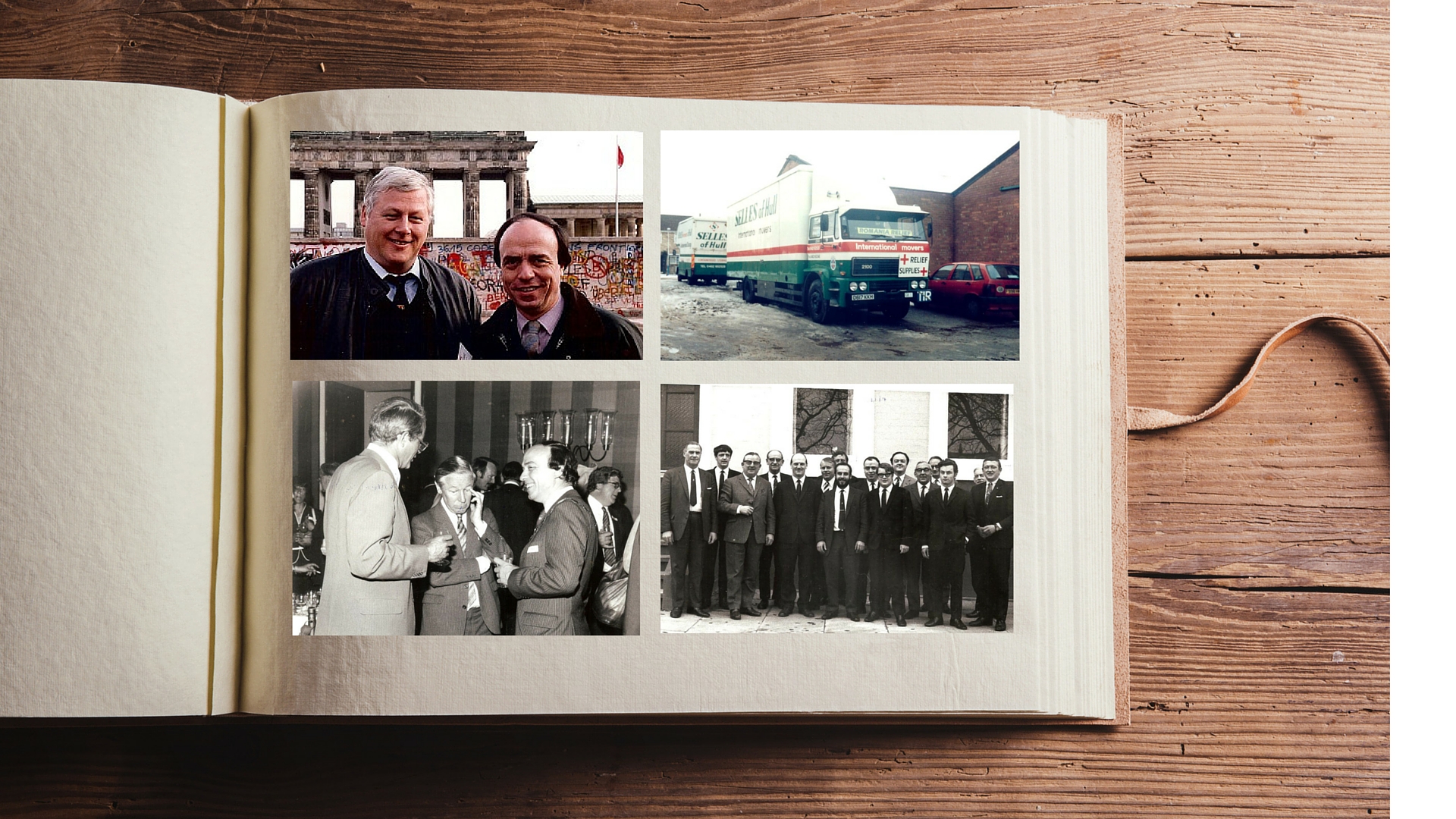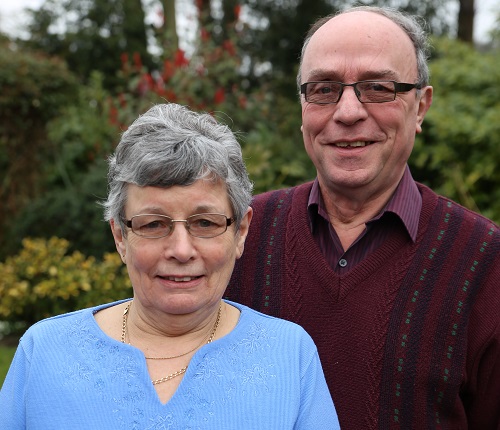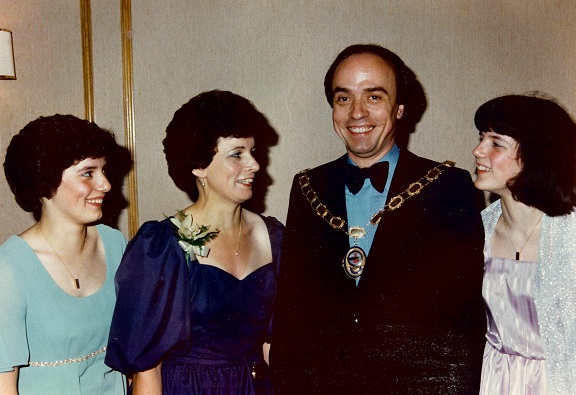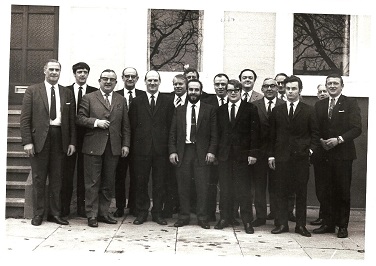Continuing The Mover’s series of interviews with industry luminaries, Steve Jordan talks to past BAR President, Institute Chairman and owner of Selles of Hull, Robin Mason.

Interviewing the elder statesmen of the industry is always a great pleasure for me. When we pass a certain age, not sure what age that might be, we all like to chat about the past: it’s very nostalgic. On one particularly wet day in March, however, I headed along the A63 to meet Robin Mason for what was to be a particularly reflective day.
Robin lives in North Ferriby in East Yorkshire. I attended secondary school there having been born only a few miles away. The roads and tracks I had cycled down as a youngster had hardly changed, yet everything was somehow different. Progress had come to the Yorkshire Wolds, and many of the things that had clearly not changed in 50-odd years, I had remembered differently. I trusted Robin’s memory would prove more reliable.
Robin lives with his wife Jane in, what I now recognise, is an idyllic Yorkshire village. It’s a mixture of the prosaic, the modest and the fabulous building projects of the rich Kingston-upon-Hull merchants and trawler skippers of yesteryear. It still felt like home, but much more prosperous than I ever felt it to be in the 1960s.
Although Robin’s name is synonymous in the moving business with Hull, 2017’s City of Culture, he’s not a local. Having left school at age 16 he was encouraged by his cousin, Len Cox, to join him in the moving industry with E W Reeves in Wokingham. Robin joined the company but Len soon left to continue his moving career with Overs and later on, Darvills. Many will remember Len for all the work he did with BAR in the development of contract conditions.
Robin, meanwhile, had been taken under the wind of Cecil Culver, the manager of Reeves, who had trained under Ernie Reeve himself some years earlier. “Ernie had taught Cecil very well and Cecil was very generous, prepared to pass on his knowledge, really old school,” said Robin. “He gave both Len and me every chance. He was an incredible man.”
Robin and Cecil kept in touch and met frequently. The last time Robin had asked whether he was 98 years old. “He said: ‘No I’m not, I’m 99 and I’ll be 100 next June and you will be coming to the party.’ It wasn’t an invitation, it was an instruction,” said Robin. “Sadly he died shortly before the party could take place.”
Education was always important to Robin. Every week he made the pilgrimage from Wokingham to Gower St. in London to attend an evening class for estimators, from 6:30pm to 8:30pm, tutored by the famous Harold Holgate and Ken Berger from Alfred Bishop. “We met all sorts of people from the industry there," said Robin. “There was a school for a week in February organised by Harold and others, all on estimating. We even went to someone’s house to do an estimate and to Bentles warehouse in Kingston that had a warehouse big enough to fit a vehicle in the lift. I took the estimator’s examination and passed. It was all due to Cecil’s encouragement.”
At that time people like Harold, Ken, Julian Dargavell who worked with Ken Bishop and Colin Gordon, Brian Charles and Michael Gerson himself gave their time freely through the Institute in an effort to make the industry better. Times really have changed.
In those days people cared about doing things right and giving customers proper service. Is there any wonder that I sometimes cast a quizzical look at the people today who claim to be able to perform an accurate estimate over the Internet? Maybe they can, but I doubt it. There is no doubt, however, that customers’ expectations have changed though.
Robin stayed at Reeves for five years before C.G. Ayres, its parent company, bought a well-established, small moving company: Bakers of Reading. Peter Lunn, MD of Ayres, asked Robin to run it. “Cecil encouraged me to go,” said Robin. “He said it would be good for me.”
 Robin and Jane married in 1966, this year they celebrate their 50th anniversary. Jane is from The Midlands and, after two years with Bakers the couple decided to return to her roots and Robin took the job of removals manager with Knight & Riley in Stoke on Trent. “I learned a lot there,” said Robin, “particularly about international work. But we didn’t much like being in Stoke.”
Robin and Jane married in 1966, this year they celebrate their 50th anniversary. Jane is from The Midlands and, after two years with Bakers the couple decided to return to her roots and Robin took the job of removals manager with Knight & Riley in Stoke on Trent. “I learned a lot there,” said Robin, “particularly about international work. But we didn’t much like being in Stoke.”
Again opportunity knocked for Robin because of education. He attended a removals management course at Leicester Polytechnic run by Cyril Batty. There he met Joe Selle from Hull who was on the lookout for an international manager. He took the job in 1971 and was soon running regular services into Europe. The company became a member of CETI (that later merged with Eurovan to create OMNI) and Robin served on its Board of Management for three years with Tom Mitchell of Davies Turner, Geoff Halliwell of Whites and Jean-Jacques Borgsted from Pelichet. “They were a tremendous crowd,” Robin remembered. “We developed CETI into a worldwide network.”
In 1980 Robin became the chairman of the BAR Institute and three years later the president of the Association. “At the age of 40 I was the youngest ever BAR president,” he said, “until John Luxford stole my record a few years later.” Joe Selle encouraged Robin, believing that the prestige would help the company become better known in the industry. Robin looked at it a little differently. He had received so much help and encouragement from the moving industry since his very first day in the business that he wanted to be able to give something back. The top job at BAR was his opportunity to do just that.
1988 saw the centenary of Selles of Hull. Joe wanted to retire but sadly suffered a severe heart attack before he was able to do so. “We had a couple of years of uncertainty then, in 1991, the family said they were selling. I was talking to Carl Cock-Johnsen from Gebr. Hertling in Berlin. He suggested I should think about buying the company. I didn’t think I could buy it but a few days later Joe Luxford said the same. He said he would help me in any way he could, but I should seriously look at it.”
 “It was a tough decision but, with a lot of help from the bank and encouragement from our friends in the industry, we decided to give it a go. It was a profitable business, but we still had a few sleepless nights.” Robin is still grateful to those people who helped and encouraged him and Jane to take the risk. “They were always there for us.” Jane became the company secretary. “She supported me 100%,” said Robin.
“It was a tough decision but, with a lot of help from the bank and encouragement from our friends in the industry, we decided to give it a go. It was a profitable business, but we still had a few sleepless nights.” Robin is still grateful to those people who helped and encouraged him and Jane to take the risk. “They were always there for us.” Jane became the company secretary. “She supported me 100%,” said Robin.
Fortunately the operational staff were happy to carry on as were the management team. The company employed about 25 people and had eight vehicles. It gave Robin and Jane (and later on Nicola, their younger daughter) a good living and plenty of travel opportunities. But Robin was determined not to suffer the same fate as Joe Selle, he wanted to retire while he and Jane were still healthy and active.
Nicola joined the business for a time and Robin hoped that she would want to continue it, but that was not to be despite Nicola taking a very active role in the industry and becoming the chairman of the Institute herself. Fiona, Robin and Jane’s elder daughter, did not want to take on the business either. So, in 2008, Robin sold Selles. “We did quite well as it was just before the recession,” he explained. Sadly the company didn’t thrive under the new ownership and it was subsequently sold to Hardaker’s in Hull, a family business established in 1870, and is still operated by the company today.
Through BAR and the Institute, Robin gave much back to the industry. He believes that it was only people with a certain disposition who became part of the industry: people who were interested in people. “We were a peculiar lot,” he said, “we helped each other.” He’s not so sure that it’s the same now. “Today it’s more corporate, people have less time. It’s not that they are unwilling to help, they are just under much more pressure. The whole way of life has changed. Perhaps that’s why the Institute folded?”
Robin and Jane have been retired now for eight years. It was an easy transition for him although he said it took a while to stop waking up at 6:00am. He has been a keen Rotarian for 20 years and Jane is District Secretary for the women’s division of the organisation: The Inner Wheel. Rotary is one of the world’s largest charities and was, Robin explained, responsible for the virtual eradication of polio worldwide. Their charitable work takes much of their time but it’s a labour of love. They also take great joy from their family, including six grandchildren and one great grandson.
Robin entered the moving industry, knowing nothing about it, with a basic education and never even having moved house himself. From that fortuitous beginning he carved out a successful career, provided others with employment and, most importantly for him, made many lifelong friends. Assn of Warehouse Keepers Annual lunch in 1983.
Photos: Main picture; top left: By the Berlin Wall with Carl Cock-Johnsen, from Gebr Hertling at a CETI meeting there; top right: a Selles vehicle ready to travel to Romania with relief supplies; bottom left: With Michael Scott and Marcus Fox MP at the National Association of Warehouse Keepers Annual lunch in 1983; bottom right: Group
at the Leicester Polytechnic Management Course in about 1971. Bottom left: the family at the BAR Conference in Brighton 1983; middle right: Robin and Jane.
Caption Competition
 Can you add in the five missing names to the faces in this photograph? No prizes, just trying to give everyone their moment of fame. This is what we know so far: Left to right: don't know the first two, Arthur Edwards, don't know, Cyril Batty, Julian Dargavell, Tommy Bell, Jeff Miles, Peter Hill, Robin Mason, Hugh Wilson, Joe Selle, don’t know the next two, Peter Barrett and John Gower. E-mail: editor@themover.co.uk
Can you add in the five missing names to the faces in this photograph? No prizes, just trying to give everyone their moment of fame. This is what we know so far: Left to right: don't know the first two, Arthur Edwards, don't know, Cyril Batty, Julian Dargavell, Tommy Bell, Jeff Miles, Peter Hill, Robin Mason, Hugh Wilson, Joe Selle, don’t know the next two, Peter Barrett and John Gower. E-mail: editor@themover.co.uk
Click here to see the next Editor's Pick